Aimee Voelz
What Makeup Taught Me About Business
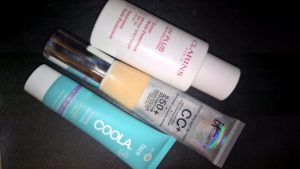 Or an alternate title for this post: My Fake Beauty Blog.
Or an alternate title for this post: My Fake Beauty Blog.
I like makeup. I like learning about new products, talking about them, trying and buying.
I did a great job of limiting the buying part for a couple of years. Then I had a streak of steady paychecks from my consulting work and suddenly the pursuit of the perfect moisturizer seemed like a good hobby. I found it after a long quest through many mediocre creams, oils and balms. It is Peter Thomas Roth’s Mega Rich Intensive Anti-Aging Cellular Crème, which provides hydration for my dry-combination skin longer than any other I’ve tried.
After that I needed a new hobby – like finding the ideal matte plum lip color. Which as it turns out, is Benefit Cosmetic’s Lollitint Cheek & Lip Stain. You see how quickly this gets out of control?
Eventually I reigned it back in.
How?
I did my taxes and my checking account became as empty as my tube of Dior Addict Lipstick in Rock’n Roll 750 that I finally finished. And won’t repurchase because Dior is not worth the hype. The best thing about Dior products is feeling like a snob for using them. Like the time my friend and I got out our powder compacts at the same time and she said her Lancome was about the same as my Dior. I laughed so hard and she said I was a total snob, which I’m laughing about again as I relay it now, as if it was a compliment.
But really, Lancome powder is better than Dior’s. And Too Faced Primed & Poreless Pressed Powder is better than both of them, and is also better than the Cover FX that I’m using now because I wanted to try something new.
Anyway, once again my Sephora problem has vanished just as the dark circles under my eyes vanish when I use Urban Decay’s Naked Skin Color Correcting Fluid.
Now I’ll have to get my makeup at Ulta – ha ha.
Just kidding! Ulta is not completely low-end. Ulta stocks It Cosmetics and Sephora doesn’t.
I just wish Ulta’s emails and circulars weren’t so stark. I hate the incongruence of reading about It Cosmetics’ Your Skin But Better CC Cream with SPF 50+ on a flimsy flyer then spending $38 to buy a tube of it. Which, by the way, although it is branded as a CC Cream, it wears like an unbelievably smooth, full coverage foundation – with SPF 50!
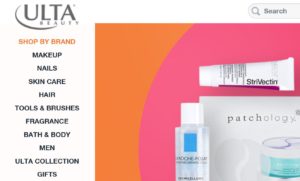
image via www.ulta.com
I also wish Ulta would stop using their orange brand colors as their main color scheme. I would like them to use their trademark orange as an accent and stick with black for the website and marketing materials. Black is the ultimate base color for cosmetic brands because it is clean and sharp and lets the products be the focus.
And…put some highlights and dimension into their flat color blocks that they use for text in their ads. Layering is the CC cream of marketing graphics, people!
I digress. And while digressing, I might as well put on a mask, like GlamGlow’s SUPERMUD Clearing Treatment. It works much better at refining pores than Murad or Origin, which soften the skin but don’t do much else. Masks are a great way to multi-task when you’re working on the computer.
Anyway, I’ve learned a lot about business from being a cosmetics consumer.
This started years ago when I was shopping for a new perfume and didn’t know where to start. The salesperson was savvy and blunt and rolled his eyes when I picked up bottles that weren’t good matches for me. He held up a bottle of Dior’s Poison perfume and asked me who that perfume was meant for. Without even smelling it, I could see that the dark, sculpted bottle was designed to appeal to a more sophisticated woman who was older than I was at that time. The heavy, spicy scent confirmed it.
Now I automatically notice how cosmetic brands and retailers advertise themselves and their products, and think about how that matches to their target audience. That’s a useful marketing skill, but observing and discerning helps in many aspects of business.
Looking at a company’s brand and how I relate to that brand helps to evaluate work opportunities. Can I align with their mission and approach? Am I a good match with their “style” – can I “wear” their brand so that I’m representing their core values in my work?
Similarly, when individual projects are underway, I like to see if they are evolving in the same way the customers’ needs and expectations are evolving.
Another way that I’ve learned about business through makeup is by watching beauty bloggers review cosmetics and give tutorials on YouTube. Did you know that some of them are making big bucks by the ad revenue generated through viewers?
I’m not surprised. They offer value to their “customers” in very specific ways. Viewers can search for particular product reviews or tutorials – like how to color correct. Or, loyally follow their favorite personalities, like Grav3yardgirl, who has more than 6.8 million subscribers.
These bloggers talk to viewers like they’re casually telling friends their opinions of specific products and sharing their tips on techniques. They show appreciation to their viewers for watching. Some of them are get-to-the-point and others are more about entertainment. For a consumer, it is a no-pressure way to get product information before making a buying decision.
So that’s how my interest in makeup taught me to evaluate brands and apply those lessons to my own business projects. But that’s all I’ve got time for now. I’ve got to go wash off my face mask.
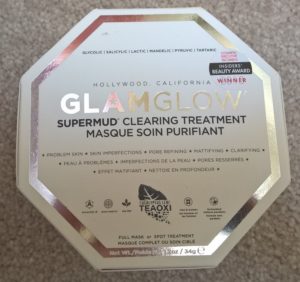
If you are struggling with your toxic work environment – good
If you are struggling with your toxic work environment – good. 
I’m sorry that you’re in a negative work situation, but the fact that you’re struggling with it is positive.
If you are resistant when your management instructs you to take actions that are bad for customers or waste shareholder money – good. You care about doing the right thing.
If you are caught between the need to speak up about workplace bullying and the need to keep your paycheck and healthcare benefits – good. Your ethics are showing.
If the subtle, persistent discrimination against certain employees leaves you feeling drained – good. Your body itself is signaling that you are in a dangerous environment.
I am sorry that you are in a job that harms your wellbeing. However, I am glad that you are reacting negatively to a noxious job situation. Your struggle reflects your morality and your desire for fairness. You have integrity. You are in touch with human decency.
I am not worried about your humanity.
I am worried about the other people, the ones who succeed in toxic work environments.
Employees who heartily laugh along with their manager’s discriminatory jokes and respond positively when others are harassed are encouraging this behavior to persist.
Employees that willingly support management decisions that waste time and money are also guilty of wasting time and money.
Employees that unscrupulous managers rely on to support their unethical tactics are also behaving unethically.
People that thrive in toxic work environments perpetuate them. They care more about advancing their careers than they care about integrity.
So, if you are struggling to survive in a toxic work environment – good.
I hope that you advocate for change that improves the situation for you and your coworkers. If that is not possible, save yourself and change jobs before you sink into a pit of stress, depression or low self-esteem.
Most importantly: I hope you keep your integrity.
Your Equal Salary is Not as Equal as You Think
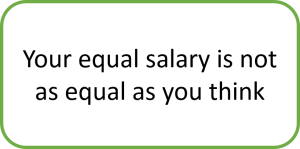 April 12th was National Equal Pay Day.
April 12th was National Equal Pay Day.
On April 11th, Microsoft posted a blog that indicated salary equity across gender and race. I applaud Microsoft and other organizations that publish their salary data. This transparency is a great first step.
It would be tempting to conclude from the information provided that there is pay equity and move on. However, salary data is not the whole story and it does not mean that there is actual pay equity.
Let’s look at the statements published on Microsoft’s blog:
“99.8 cents earned by women for every $1 earned by men with the same job title and level in the U.S.” and “$1.00 earned by racial/ethnic minorities for every $1 earned by Caucasian employees with the same job title and level in the U.S.”.
The key words are “same job title and level.”
In many organizations people can have the same job title and the same job responsibilities, but be in different pay levels. As a fictitious example, let’s take the title “Project Manager”. This is not the same as job ladders that start with Product Coordinator, move to Project Manager, then Senior Project Manager, Lead Project Manager, Project Director, and so forth. For the title Project Manager alone, there may be multiple pay bands – say level 15, 16 and 17, with the higher levels earning larger salaries and potential bonuses.
This is the first area where pay equity breaks down quickly. Let’s look at three fictitious employees:
- Employee A is a white man in pay level 17 with a salary of $80,000
- Employee B is a white woman in pay level 16 with a salary of $70,000
- Employee C is a black man in pay level 15 with a salary of $60,000
All three of these employees may be performing the exact same job duties, but Employee A has a higher salary and may also have a larger bonus, raise, and other compensation awards.
If it seems confusing how employees performing the exact same job may be in different pay levels, here is an example that is parallel to how many organizations function: consider a company that manufactures printer paper. In a team of Project Managers, Employee A is responsible for paper with recycled content, Employee B is responsible for premium paper, and Employee C is responsible for multi-colored printer paper. They all have the same day-to-day job duties and their performance can be measured in the same ways.
Employers can justify employees doing the same jobs at different pay levels by claiming differences in work experience or subjective differences in skills.
Compiling data to determine salary equity by job role vs. level is straightforward. An employer only needs to compare the data for each job title at each pay level. What is the race/ethnicity and gender breakdown for each? Let’s say there are 300 employees in each of the Project Manager pay levels from the example above. If there are 25 women in level 17 and 250 women in level 15 – you don’t have pay equity.
Bonuses and awards are another area where compensation inequity exists. People performing the same job, whether in the same salary level or not, often receive different compensation in the form of cash awards, stock awards or options, and non-cash awards such as trips and gifts of products or services.
Raises and promotions can also be inequitable. Are employees of all genders and ethnicities receiving the same percentage of salary increases? Are they promoted with the same frequency?
Publishing salary data is a critical first step. Now let’s see companies publish the gender and race/ethnicity data for:
- The same job titles at different pay levels
- The dollar value of bonuses and awards
- Raises and promotion frequency
When this data is published then it will be clear if an organization has pay equity or not. Until then, let’s remember that the salary data by pay level is only one compensation metric and it is not the whole truth.
Your Performance Review Isn’t Fair
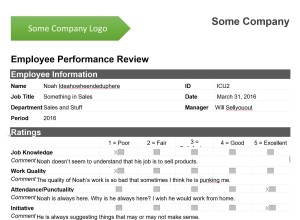 Your performance review is not about how well you served your customers, increased profits, reduced costs, expanded the business, or improved employee morale.
Your performance review is not about how well you served your customers, increased profits, reduced costs, expanded the business, or improved employee morale.
Your performance review is not fair whether it is positive or negative, whether you want to believe it is 100% true or 100% false, and whether you like or loathe your manager.
Your performance review reflects how well you served the department’s objectives.
Perhaps the objectives are clearly defined and understood. Book X amount of sales in new business; Y amount in renewals. Seems non-subjective. What’s the problem?
So many.
So many problems.
For example:
1) Employee A exceeds the sales goals. She should get an excellent review, no? But she doesn’t, because the review process allows for subjective feedback in addition to the objective numbers, and her manager writes in her review that she is not a team player, has low long-term prospects to grow in the company, and lacks initiative.
2) Employee B does not meet the sales goals. He should get a below average review, yes? No, he gets a glowing review. His manager notes in his review that there were unusual circumstances that prevented him from achieving the goals. The economy slowed sales. And, this employee is a positive contributor to the team and deserves an above average review.
3) Employee C does not meet the sales goals. He notes in his self-evaluation that his top customer was restructuring and unexpectedly froze large purchases for the current year. However, he proposed a set of products that would help the customer save significant costs through efficiency, and the customer committed to a purchase that would set a new record in next quota period, plus sustain sales for years to come. So this employee missed his current year goals in order to do the right thing for the customer and for his employer in future years. He should get a great review for doing the right thing for the business, right? No. His manager gave him a poor performance review for not meeting current goals.
These employees are just as likely to report to the same manager as they are to three different managers in the same department, or different managers in different parts of the company.
Disconnect your self-image and self-worth from what your manager writes on your performance review. That document might matter in terms of the bonus or raise you get, or whether you get promoted or are being pushed to leave the organization. However, it isn’t fair, so don’t let it mean more to you than what it is: a tool in the game you signed up for when you accepted this job.
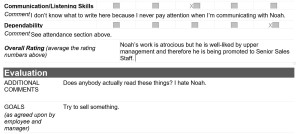
Lets Take a Break From Politics to Complain About Our Jobs
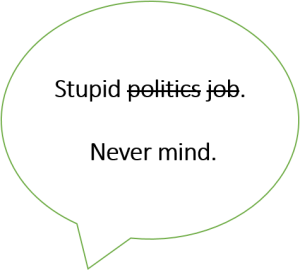 Can we just take a break from despising each other because of our political beliefs and unite in agreement that our jobs suck?
Can we just take a break from despising each other because of our political beliefs and unite in agreement that our jobs suck?
Yes, our mutual distaste for our jobs can bring us together.
What? You say you would like to complain about your job but you don’t have one?
All right, fine, circle the number below that best describes why we should scorn you for your lack of employment:
- Victim of discrimination by entitled jerks
- White male victim of reverse discrimination
- Victim of discrimination against ESL (English as a Second Language) speakers
- Lost job to overseas outsourcing
- Company shut out unionizing workers
- Unions shut out non-union workers
- Lack of access to childcare
- Vs why do you have so many kids you can’t afford
- Vs birth control is immoral
- Vs its none of your damn business
- Vs stop swearing
- Vs damn is still a swear word?
- …….
- ………..
Forget it, don’t answer. My scorn reservoir is running low anyway.
But the rest of you. You agree that our jobs suck. Thank you.
Tell me about it.
You…you’re an underemployed millennial with $50,000 in unpaid student loans. Working three jobs, living with six roommates?
Oh I got that wrong? Actually, you’re complaining about underemployed millennials. You’re an underemployed boomer competing with them for jobs.
Got it.
Let’s move on.
I mean, we can all agree our bosses are assholes, amIright?
Wait a minute, I work for myself.
I’m no saint but that’s kind of harsh.
And I like my job.
I give up.
Remembering What Was Good About A Bad Job
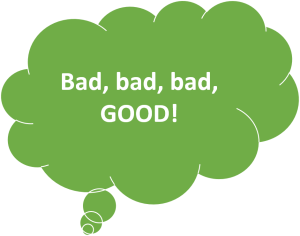 Last weekend I spent time with a friend that I met when I was at a not-so-favorite job. Let’s just say that particular job had many challenges. And not the exhilarating kind that lead to career success and personal fulfillment.
Last weekend I spent time with a friend that I met when I was at a not-so-favorite job. Let’s just say that particular job had many challenges. And not the exhilarating kind that lead to career success and personal fulfillment.
I hadn’t seen this friend in a long time and it popped into my head that her friendship was one of the best things I got from that job. We had a lot of fun while we helped each other cope.
That made me want to remember the other positive outcomes that came from a difficult work experience. Here are a few:
- I am passionate about the projects I managed and am proud of what I accomplished.
- I got to explore two specific types of marketing that I was less familiar with. I built solid skills in those areas that gave me the necessary qualifications for future work.
- I formed friendships and trusted relationships with colleagues that are still important to me.
These benefits are obvious to me, and I acknowledge them when they impact me. When I thought about it more I realized there are less obvious and more personal benefits:
- I learned what my boundaries are and sharpened the line between what I am and am not willing to do to succeed in business.
- I finally accepted that business isn’t always fair. Accepting this killed some of my idealism. However, it affirmed the type of businessperson I am and made it easier to detach from the fairness of an outcome that is not in my control.
- I changed my definition of success. Climbing the corporate ladder is only one way of evaluating success. There are many different ways to be successful in business – not to mention in life.
It takes time to recover after leaving a negative job, just as it does when leaving any significant relationship that was painful. If you’re recently out of a tough work situation I hope that you allow yourself to be angry about what wasn’t right and grieve for the hopes you had for that role.
Eventually, I hope you will also remember what you gained.

Biz Lessons from the Diner, Zola Twitter Style
OK listen up. Long story.
So I’ve been having these cravings for pork & pineapple. No idea. So today I walk by the local diner & see an ad for BBQ pork + pineapple omelets.
So I’m like damn, my craving! I lowkey sit at the counter cuz it’s busy. Coat’s not off & the busser puts coffee down–nice!
I ask, can I order and he’s like no the waiter has to do it and he points to a server who looks about 17 waiting on a booth behind me.
So I’m like ok, drink coffee a while & the server never comes! He’s walking between the counter & booths, doesn’t even look at me!
I think maybe he thinks I’m just drinking coffee so I lay the menu closed flat away from me. Cuz that’s the signal to order food now!
Nope. Then this baby server (NOT the same one) asks a guy a few seats on my left if he’s ready to order. I say to the couple on my right:
“AM I IN THEIR BLIND SPOT or what” & we’re laughing but I’m annoyed. The couple’s all casual, talking to me.
Now the busser refills my coffee and I ask can he get a waiter. He goes straight away & talks to them. So I’m like ok, they’re ready.
Nope. 17 goes past, no eye contact, asks people who sat after me for their order. I WAS DONE. I WAS HANGRY.
I get my things & say to the couple I can’t deal w/this today. Real quick the woman jumps up, says “No I’ll find someone, I know the owner.”
I just want to go but I was like yea ok & this normal age guy comes over all “I’m in another section but I can take your order.”
I’m like I just want the omelet special but nobody is looking at me except the busser. He goes I’m real sorry, you want hashbrowns.
Then the woman goes “Put it on my tab” and I say OMG you’re so nice thank you but I’m thinking damn my stupid craving.
Then the normal age waiter goes “No, it’s on the house I’m sorry you had to wait.” I was like OHHH, well thank you.” Awkward silence.
I get my food & 17 is by every 10 min, how is it, coffee? The couple’s talking w/me, glad you stayed & all. We’re saying he’s young, he…
Doesn’t know to watch the room. I feel stupid but the omelet is good, the pineapple’s on the top not inside, but it’s good.
The couple’s my new BFFs, we exchange #’s & they tell 17 they tipped him & the normal age waiter in their bill & say bye and leave.
I ask 17 “did you just not see me?” Cuz he didn’t apologize & for real I wanted to know what was what. He just says “I got double-seated.”
Then I’m done eating & he goes “my manager said it’s free.” SO I tip $10 & say thanks, know you’re busy. But I’m thinking you saw me…
But didn’t make eye contact & say “be right w/you” & why did he serve later people BEFORE me, TF?
I don’t care about getting comped or waiting, it was being flat out ignored like nobody was going to serve me ever. Awkward as hell.
I don’t want to go back there cuz I’m embarrassed. But there’s one good thing: made me think how to do better in any kind of biz.
Acknowledge customers because NOBODY LIKES TO BE IGNORED. Apologize for screw ups. Serious, don’t pretend you didn’t screw up.
And if you read this whole thing to get to the biz part at the end you’re hilarious!
This Twitter-style post was inspired by Zola’s brilliant Twitter storytelling, which was repackaged into Storify by Mike.
Writing About the Writing on Jezebel
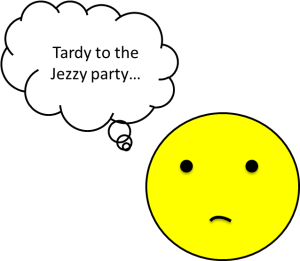 I’ve only recently discovered Jezebel and now have the pleasure and pain of reading old articles that I’m too late to comment on. It’s like reading about conversations on topics I care about that took place at the most amazing dinner party that I didn’t know I had been invited to.
I’ve only recently discovered Jezebel and now have the pleasure and pain of reading old articles that I’m too late to comment on. It’s like reading about conversations on topics I care about that took place at the most amazing dinner party that I didn’t know I had been invited to.
The articles are well-written and sometimes shine a light on under-represented groups and the dark sides of societal norms. These pieces are especially interesting to me because I’m trying to be aware of situations when my unconscious biases need to be checked.
Since I’m too late to be part of the discussion in the comments, writing about them is the next best thing.
My favorite post from the past is “A College Freshman Turned in My Blog Post as His Homework” by Dodai Stewart. Stewart was notified by a college professor that a “…white male student attempted to get by on the intellect of a brown woman…by stealing her work on appropriation.” Stewart describes the incident and aftermath, and ponders how to respond to the student’s apology.
The plagiarized work was from Stewart’s piece “On Miley Cyrus, Ratchet Culture and Accessorizing With Black People”.
There are 854 comments on the post and almost all of them are insightful, informative, hilarious, or a combination of all three. When I was done, I felt like I’d read a book that wove together bits of information on college writing skills, plagiarism, flimsy apologies, cultural appropriation, and humor.
I’ve given up reading comments on most sites because the hatred expressed makes me fearful and depressed for the state of humanity. But Jezebel comments…so little trolling and the snark is good-snark. It’s smart without the “smarter than thou” tone.
I’ve got Stewart’s piece bookmarked so when I’m miserable from political campaigns and social network posts that read like hate speeches, I can return to a beacon of hope in the dark world of the interwebs.
How To Tell If You Have A Cat And Other Business Problems
 I have a problem. I’ve been experiencing unusual symptoms and can’t tell if I have a cat or not.
I have a problem. I’ve been experiencing unusual symptoms and can’t tell if I have a cat or not.
You’re probably thinking “Seriously, how can you not know if you have a cat.” Let me remind you that a 47 year old woman recently gave birth one hour after realizing she was pregnant. Sometimes it’s hard to tell these things.
Today I met with a trusted advisor to see if she could help me determine if I have a cat or not. She had a series of questions about my symptoms:
Advisor: Is there is a cat in your house?
Me: Well, I can’t say for sure. I saw a cat on the stairs yesterday but haven’t seen one yet today. Sometimes they hide or sleep in weird places, so there might be a cat in the house. Or not.
Advisor: Are you feeding a cat?
Me: This seems black and white, but it isn’t that simple. I put out food and then when I check the dishes later, they are less full, but I haven’t actually witnessed a cat eating food. Maybe the food evaporates. Or a raccoon sneaks in and eats it. I saw the tail end of something that looked like a raccoon on my bed.
Advisor: Let’s backup. When did you first notice that you might have a cat?
Me: OK, I can answer this one. My neighbor was going out of town and asked if I’d like to watch her cat at my house. One of her other two cats picks on this one. So she brought the cat over with some food and litter and when she let her out of the carrier, she promptly ran and hid under a chair (the cat, not my neighbor). This was about two weeks ago.
Advisor: Great. So we know there has been a cat at your house recently. Now we just have to determine if you have a cat. Cat owners name their cats. What is her name?
Me: <sigh> This is another question that is tough to answer. My neighbor told me that the cat’s name was Stripes when she adopted it from another family. I have a hard time pronouncing that word…it gets tangled up in my mouth. She’s not really my cat, I think, so it doesn’t seem right to rename her. For now I’ve been referring to her as “She who shall not be named”. I did catch myself thinking of cat names, though.
Advisor: I see. Did your neighbor return home?
Me: I think so, but I haven’t actually seen her. I didn’t hear from her on the day that she was supposed to return, so I sent her an email and asked if she needed me to watch the cat for a while longer. She said that would be helpful.
Advisor: Hmm, that is vague. Let’s try a rapid-response technique. Just say the first answer that comes to mind. Ready? Cat hair!
Me: Everywhere!
Advisor: Vomit!
Me: None, thank God!
Advisor: Litterbox!
Me: Yes!
Advisor: Meow!
Me: Meow!
Advisor: Did you really just meow back at me?
Me: <defensively> You said to say the first thing that came to mind!
Advisor: I think you should give it more time to see if it clears up on its own.
And that is how we ended the conversation.
I still don’t know if I have a cat. But I know I love metaphors, so here’s one: Sometimes at work something is obvious to a few people and the rest just don’t get it.
For example, rumors of pending layoffs are percolating and several people ramp up their networking while the rest are shocked and unprepared when they are let go. Or a new vice president takes over a division and some people pay extra attention to the direction the wind is blowing. The others are surprised and dismayed when groups are reorganized, budgets are reallocated and projects are reprioritized.
It’s almost as if a few people have their eyes open and the rest are wearing dark glasses. I recommend keeping your eyes open. You’ll be better prepared for change and have an advantage over your coworkers who aren’t paying attention.
Some people naturally absorb many details around them and don’t get bogged down by what is right in front of them. If that is part of your personality already then take advantage of it! Practice putting it to use by listening to hallway conversations instead of tuning them out. When senior leaders are talking, don’t take their words at face value. How are they delivering their messages – vaguely, talking around issues, or over-emphasizing that people should “stay focused on their work”?
If observing everything is not natural to you but you want to be highly regarded and get promoted, then you can approach this by being politically savvy. Don’t worry about paying attention to everything. Instead, pay a lot of attention to what senior management is doing.
Who are they meeting with and how frequently? What projects are they most interested in? Is there a change in their usual routines? Make sure you greet them and ask what they’re focused on these days, and if there’s anything you can do to help. You can piece together a lot of information with these tactics.
Don’t be a weirdo hanger-on or an over-eager, desperate wannabe. We know those people and despise them, right?
Be natural and nonchalant while you are being curious and observant. Then maybe you’ll be quick to realize when the business is shifting and be able to make your choices proactively.
As for me, I’m going to buy some kitty litter. I want to be prepared in case I have a cat.

 Or the title that I prefer: My sock drawer is good for business.
Or the title that I prefer: My sock drawer is good for business.





Recent Comments